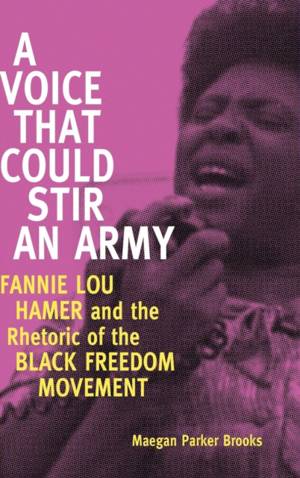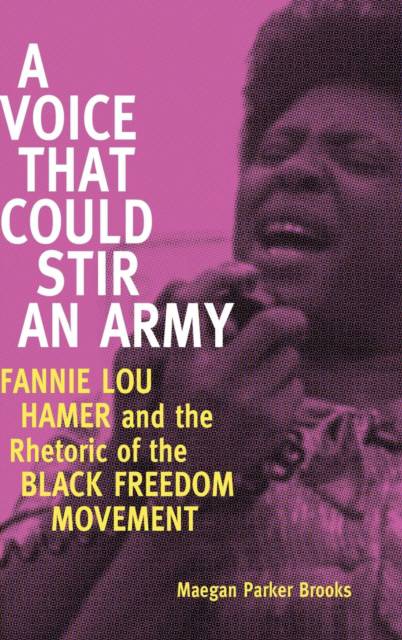
Bedankt voor het vertrouwen het afgelopen jaar! Om jou te bedanken bieden we GRATIS verzending (in België) aan op alles gedurende de hele maand januari.
- Afhalen na 1 uur in een winkel met voorraad
- In januari gratis thuislevering in België
- Ruim aanbod met 7 miljoen producten
Bedankt voor het vertrouwen het afgelopen jaar! Om jou te bedanken bieden we GRATIS verzending (in België) aan op alles gedurende de hele maand januari.
- Afhalen na 1 uur in een winkel met voorraad
- In januari gratis thuislevering in België
- Ruim aanbod met 7 miljoen producten
Zoeken
A Voice That Could Stir an Army
Fannie Lou Hamer and the Rhetoric of the Black Freedom Movement
Maegan Parker Brooks
€ 186,95
+ 373 punten
Omschrijving
A sharecropper, a warrior, and a truth-telling prophet, Fannie Lou Hamer (1917-1977) stands as a powerful symbol not only of the 1960s black freedom movement, but also of the enduring human struggle against oppression. A Voice That Could Stir an Army is a rhetorical biography that tells the story of Hamer's life by focusing on how she employed symbols-- images, words, and even material objects such as the ballot, food, and clothing--to construct persuasive public personae, to influence audiences, and to effect social change. Drawing upon dozens of newly recovered Hamer texts and recent interviews with Hamer's friends, family, and fellow activists, Maegan Parker Brooks moves chronologically through Hamer's life. Brooks recounts Hamer's early influences, her intersection with the black freedom movement, and her rise to prominence at the 1964 Democratic National Convention. Brooks also considers Hamer's lesser-known contributions to the fight against poverty and to feminist politics before analyzing how Hamer is remembered posthumously. The book concludes by emphasizing what remains rhetorical about Hamer's biography, using the 2012 statue and museum dedication in Hamer's hometown of Ruleville, Mississippi, to examine the larger social, political, and historiographical implications of her legacy. The sustained consideration of Hamer's wide-ranging use of symbols and the reconstruction of her legacy provided within the pages of A Voice That Could Stir an Army enrich understanding of this key historical figure. This book also demonstrates how rhetorical analysis complements historical reconstruction to explain the dynamics of how social movements actually operate.
Specificaties
Betrokkenen
- Auteur(s):
- Uitgeverij:
Inhoud
- Aantal bladzijden:
- 324
- Taal:
- Engels
- Reeks:
Eigenschappen
- Productcode (EAN):
- 9781628460049
- Verschijningsdatum:
- 1/04/2014
- Uitvoering:
- Hardcover
- Formaat:
- Genaaid
- Afmetingen:
- 152 mm x 229 mm
- Gewicht:
- 644 g

Alleen bij Standaard Boekhandel
+ 373 punten op je klantenkaart van Standaard Boekhandel
Beoordelingen
We publiceren alleen reviews die voldoen aan de voorwaarden voor reviews. Bekijk onze voorwaarden voor reviews.









